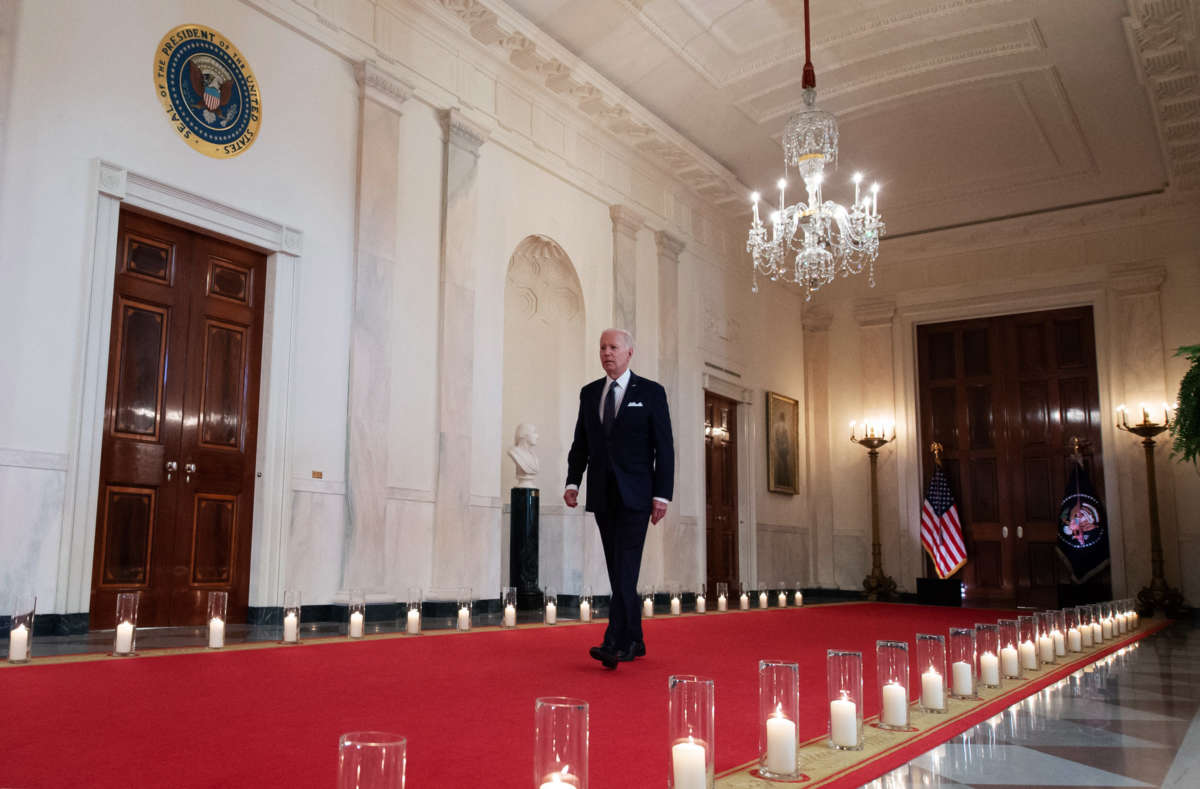Two and a half years removed from his campaign trail vow to make Saudi Arabia’s leaders “pay the price” for their role in the murder of journalist Jamal Khashoggi, U.S. President Joe Biden is reportedly planning to visit Riyadh in the coming days as part of the White House’s effort to shore up ties with the oil-rich kingdom as Russia’s war on Ukraine roils global energy markets.
The timing of the trip has not yet been finalized, but the New York Times reported Thursday that Biden intends to add the Riyadh visit to his planned visit to Israel and Europe later this month.
Saudi Arabia is the third-largest oil producer in the world behind the U.S. and Russia, and the kingdom has previously resisted the Biden administration’s calls to pump more oil amid surging gas prices. But more recently, the Saudi kingdom has indicated a willingness to ramp up production if Russia’s output tanks due to the West’s sanctions regime.
According to the Washington Post, for which Khashoggi worked as a columnist, Biden administration officials have come to view a presidential visit to Saudi Arabia “as a necessary act of realpolitik to lower energy prices and inflation, despite a campaign promise to further isolate Riyadh.”
Matt Duss, a foreign policy adviser to U.S. Sen. Bernie Sanders (I-Vt.), was among those criticizing the planned visit as egregiously hypocritical, flying directly in the face of Biden’s rhetoric on the campaign trail and since taking office.
“If anyone can explain to me how this reflects the administration’s previously stated commitment to ‘a world in which human rights are protected, their defenders are celebrated, and those who commit human rights abuses are held accountable,’ I’d love to hear it,” said Duss.
Bill McKibben, an environmentalist and co-founder of 350.org, tweeted that he “can’t wait for the day when the world can stop sucking up to murderers simply because they have oil.”
During his trip to Riyadh, the president is expected to meet with Crown Prince Mohammed bin Salman, the de facto Saudi leader whom intelligence agencies say approved the gruesome killing of Khashoggi — a U.S. resident — inside the Saudi consulate in Istanbul in 2018.
The murder sparked international outrage, which then-presidential candidate Biden joined in 2019 with his vow to make the Saudi kingdom a “pariah.”
Biden also pledged at the time to “end the sale of material to the Saudis where they’re going in and murdering children,” referring to the Saudi-led coalition’s yearslong, catastrophic war on Yemen — which the U.S. has aided every step of the way with arms and logistical support.
But Biden is now facing mounting criticism for reneging on his promises. Despite the president’s February 2021 call for an end to U.S. support for all “offensive operations” in Yemen, the administration has continued providing the Saudis and the United Arab Emirates with weapons and jet maintenance services.
While a newly extended humanitarian truce in Yemen has provided a brief reprieve to the poor and war-ravaged nation, it remains in a state of deep crisis with millions — including many children — facing starvation, disease, and displacement.
In a statement on Thursday marking news of the deal to extend the fragile truce for two months, Biden lavished praise on Saudi Arabia, claiming the kingdom “demonstrated courageous leadership by taking initiatives early on to endorse and implement terms of the U.N.-led truce.”
Biden did not mention that the Saudi crown prince, commonly known as MBS, is the chief architect of the assault on Yemen, which began in 2015 with the support of the Obama administration. The Biden administration has declined to directly penalize MBS for his role in the Khashoggi killing or the humanitarian nightmare in Yemen.
“Applauding MBS’ ‘courage’ for supporting a ceasefire in a war the Saudi crown prince himself started — and to use that as a pretext for the presidential meeting — speaks to Biden’s desperation to lower gas prices, as well as to our need to end this dependency on Saudi Arabia,” said Trita Parsi, executive vice president of the Quincy Institute for Responsible Statecraft.
“Rather than rebuilding relations with Riyadh, Biden’s hat-in-hand approach will likely exacerbate the longstanding problems in U.S.-Saudi relations,” Parsi warned. “It will increase our dependence on the kingdom, which has long given its rulers carte blanche to act against American interests in the Middle East and beyond.”
“MBS is playing hardball with the United States,” Parsi continued, “and Biden just let him win.”
Sunjeev Bery, executive director of Freedom Forward, argued that “it makes no sense to strengthen Saudi Arabia’s oil dictator in order to stop Russia’s oil dictator.”
“The planet is on fire,” Bery added, “and Biden is about to reestablish relations with one of the key arsonists.”
Our most important fundraising appeal of the year
December is the most critical time of year for Truthout, because our nonprofit news is funded almost entirely by individual donations from readers like you. So before you navigate away, we ask that you take just a second to support Truthout with a tax-deductible donation.
This year is a little different. We are up against a far-reaching, wide-scale attack on press freedom coming from the Trump administration. 2025 was a year of frightening censorship, news industry corporate consolidation, and worsening financial conditions for progressive nonprofits across the board.
We can only resist Trump’s agenda by cultivating a strong base of support. The right-wing mediasphere is funded comfortably by billionaire owners and venture capitalist philanthropists. At Truthout, we have you.
We’ve set an ambitious target for our year-end campaign — a goal of $125,000 to keep up our fight against authoritarianism in 2026. Please take a meaningful action in this fight: make a one-time or monthly donation to Truthout before December 31. If you have the means, please dig deep.
